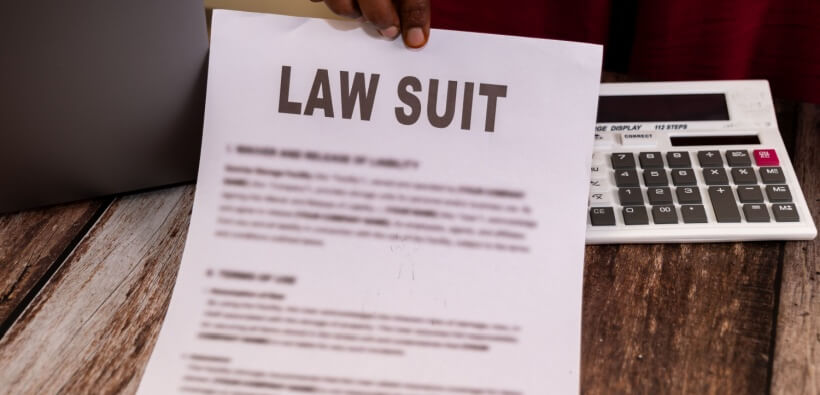How to Protect Your Business From Lawsuits With the Right Insurance

What if you could lose everything you built without any kind of warning?
If you have your own business, you may not think you need the protection of good commercial insurance. After all, you might think that your company is small and you have very few assets you need to protect. However, there is one major threat you might not have considered, and it could potentially take everything away from you. That threat, of course, is getting sued.
A good commercial policy does more than protect things like assets and buildings. It also offers the business lawsuit protection you need to make sure that a single angry customer or vendor cannot end your entrepreneurial dreams – and cause chaos across your financial health.
Wondering how to protect your business from lawsuits? Keep reading to discover how an InsureOne Insurance agent will show you what the right insurance can do for you.
Why Every Business Needs Insurance to Protect Against Lawsuits
You might not think you really need business insurance for lawsuits. If you have never been sued, for example, you might not realize how devastating it can be if you lose in court. Moreover, you might think that it could never happen to you and your own company.
In reality, the threat of legal action is quite real. Any entrepreneur can get sued at any time, and this can create a lasting financial impact that cripples or even completely kills a business. Below, you will learn more about this threat and what you can do about it.
Understanding the Risk of Lawsuits in Business
There are many different reasons why someone might choose to sue, including obvious ones, such as employment disputes with workers and contract disputes with vendors. But there are less obvious threats you might face, including IP infringement suits (for when someone thinks you have stolen their idea), regulatory suits (when you run afoul of a governmental agency), liability suits (when a customer gets injured and holds you responsible), and more. Frankly, there are so many potential threats that commercial insurance for lawsuits is necessary to keep yourself safe.
The Financial Impact of Lawsuits on Businesses
Businesses face a number of potential financial consequences if they get sued, including loss of sales while work is disrupted; losses may continue thanks to potential reputational damage that you may never recover from if you lose the case. Even if you win in court, out-of-pocket legal fees can destroy your business. Fortunately, getting business insurance for lawsuits means your court costs will be covered by your carrier.
4 Types of Insurance That Protect Your Business From Lawsuits
It is vitally important to get commercial coverage for lawsuits. However, there are many types of policies designed to protect entrepreneurs. And you may need the protection of more than one of them in order to keep your own company safe.
What are the types of business insurance for legal protection? How do these policies work, and what can they do to shield entrepreneurs from harm? Below, you will discover everything you need to know.
1. General Liability Insurance: Protecting Against Third-Party Claims
Liability insurance for businesses is important because it protects against claims that your company caused someone bodily harm or that it was responsible for property damage. This type of business liability coverage also protects against other threats, such as slander and libel.
2. Professional Liability Insurance: Coverage for Errors and Omissions
In addition to general liability insurance, you also need professional liability insurance. This policy is designed to protect your company against claims related to errors, malpractice, and negligence. This is also known as “errors and omissions” coverage.
3. Workers’ Compensation Insurance: Protecting Your Employees and Your Business
If you have employees, then it is a requirement of the federal government that you have workers’ compensation insurance. In the event that one of your workers experiences a work-related injury or illness, this policy will cover their medical care and pay for their lost wages. This helps to keep employees happy, making it one of the best forms of business insurance to prevent lawsuits.
4. Product Liability Insurance: When Your Products Cause Harm
If you make and sell products, there is always a chance some of them will be defective. A product liability policy protects you in the event that someone claims they were harmed by one of your defective products. For companies reliant on manufactured products, this is arguably the most important type of business insurance for legal protection.

How to Evaluate Your Business’s Insurance Needs to Prevent Lawsuits
What is the right business insurance to prevent lawsuits? There is no “one size fits all” model because no two businesses are exactly alike. For example, if you do not have employees, you will not need to purchase workers’ comp. And if you do not manufacture products, you will not need a product liability policy.
What lawsuit protection is best for you? Below, you will learn more about how to conduct a risk assessment and work with a reliable carrier to create a custom coverage package tailor-made for your specific needs.
Conducting a Risk Assessment to Identify Your Insurance Gaps
To get the best lawsuit coverage for your business, you need to honestly assess the risks you are most likely to face. This might include the risk of natural disasters (floods, earthquakes, etc.), the risk of IP infringement suits (such as from a rival entrepreneur), and the risk of theft or damage (if, for instance, you work in a high-risk area). A conversation with your carrier may help you discover additional risks from which you need protection.
How to Work With an Insurance Agent to Tailor Your Coverage
Reliable carriers like InsureOne offer trained agents who can help you choose the right insurance for your small business. Not every company needs every type of commercial policy. By speaking with the right agent, you can tailor a package that maximizes your protection while minimizing how much you pay.
Protect Your Business From Lawsuits
Now you know how to protect your business from lawsuits. This includes assessing the risks you face and picking the policies best suited to your needs. But do you know who can help provide all of the protection you will need, both personally and professionally?
Here at InsureOne, we specialize in business lawsuit protection. When you are ready to protect your greatest investment, come get a quote online. You can also pick up the phone and give us a quick call at 800-836-2240. Finally, feel free to come find an InsureOne office near you.
FAQs
Can Business Insurance Cover Legal Fees If I Am Sued?
As long as this type of lawsuit is specified in your policy, your legal fees will be covered. For example, if you are sued by a customer who slips and falls at your store, your fees will be paid as long as you have business liability coverage.
Does Business Insurance Cover Lawsuits Resulting From Cyberattacks?
Certain commercial policies offer lawsuit coverage for businesses that have experienced cyberattacks. InsureOne can help to customize a cyber liability package for your exact needs, offering cutting-edge lawsuit protection suited for the 21st century.
Does Business Insurance Cover Lawsuits From Employee-Related Incidents?
Many commercial policies effectively offer business lawsuit protection even if you are being sued because of the actions of an employee. For example, someone may get injured due to worker negligence, but the customer will ultimately sue you rather than the employee. Fortunately, a general liability policy will still cover your legal fees.
Can Business Insurance Protect Me From Lawsuits Caused by My Independent Contractors or Third-Party Vendors?
Many commercial policies can protect you against lawsuits caused by independent contractors or third-party vendors. For instance, general liability often protects the business even if the issue was caused by someone else. As always, you should read the fine print of your specific policy and ask your carrier if you have any questions about what is and is not covered by your commercial package policy.



